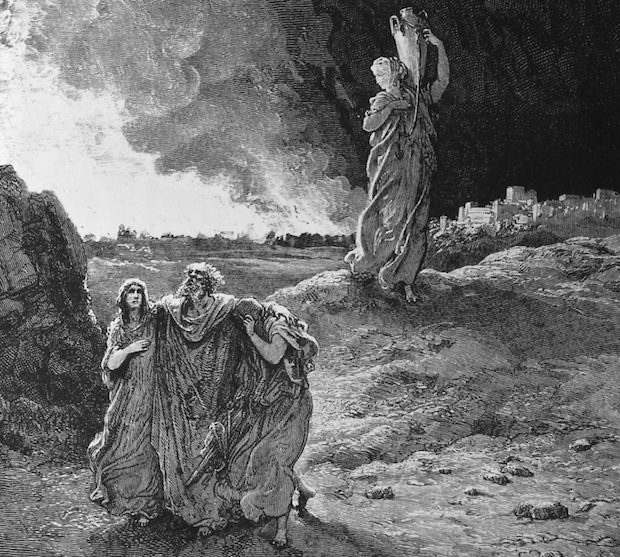The Salvation Of Sodom

Ever heard of Bishop Nunzio Galantino? Crux’s John Allen reported on him back in May. Excerpts:
If you’re seeking the prototypical “Pope Francis bishop,” you need look no further than Nunzio Galantino.
Francis overlooked all 500 Italian bishops to pluck Galantino out of obscurity and name him head of all Italian bishops. Galantino, appointed by Benedict XVI in 2011, was very last of all the bishops in a poll of the Italian episcopate requesting their input in who should govern them — yet Francis went to the back of the line to elevate him. Why? Allen writes:
What did Francis see that he liked?
Well, probably for one thing the fact that when Galantino was named a bishop in 2011 by Pope Benedict XVI, he asked that whatever money people would have spent buying him gifts for the occasion be used instead to serve the poor.
For others, Galantino opted to live at the diocesan seminary rather than the bishop’s palace in Cassano all’Jonio, he didn’t want either a secretary or a chauffeur, and he asked people to call him “Don Nunzio” rather than “His Excellency.”
In other words, he was the “Pope Francis of Calabria” before Francis was even elected.
Since Galantino stepped onto the national stage, he’s stirred the waters repeatedly.
In May 2014, he riled conservatives by saying, “My wish for the Italian Church is that it is able to listen without any taboo to the arguments in favor of married priests, the Eucharist for the divorced, and homosexuality.”
Prior to the pope’s first Synod of Bishops on the family, Galantino appeared to align himself with progressives seeking to open the door to Communion for the divorced and remarried, saying, “The burden of exclusion from the sacraments is an unjustified price to pay, in addition to de facto discrimination.”
Galantino irritated cultural conservatives again in June 2015 by appearing to throw cold water on a lay-organized rally called “Family Day,” staged to protest a draft civil unions law.
Allen concluded his report with these lines:
Nevertheless, there’s no doubt on one point: Without Pope Francis, few people outside of southern Italy probably ever would have heard or seen Bishop Nunzio Galantino, while today he’s become one of the most consequential Catholic prelates in the world.
In that sense, to find the “Francis effect” in action, he’s about as clear an example as we’ll ever get.
Got that. OK.
At World Youth Day, Bishop Galantino gave a homily to Italian youth present, in which he taught that God saved Sodom from destruction. Here’s a link to the homily in Italian. Reader Giuseppe Scalas has translated the key passage:
“The intense dialogue between God and Abraham in the first reading tell us about prayer. And it’s about prayer that Jesus is asked in the Gospel. A prayer which is not an escape from troubles and responsibility, but a live experience made of listening and answering, through which God creates an authentic relationship and pushes us to be daring. As daring as Abraham’s intercession prayer in favor of Sodom. A city upon which nobody would have bet a dime. His intercession prayer and his will to dare save Sodom. The city is saved because some righteous ones are there, even though a few of them. But the city is saved above all because Abraham, a man of prayer, is not a relentless accuser, he doesn’t speak against but in favor. Abraham, man of prayer, doesn’t point to the misdeeds, but he announces the possibility for something new. Abraham, man of prayer, announces and invites to look at the positive possibilities. Abraham, man of prayer, is a tireless searcher for sign of hopes to present to the Lord for Him to give them value.”
Bishop Galantino is talking about the dialogue between God and Abraham recorded in Genesis 18. God was planning to destroy Sodom for its wickedness, but Abraham pleaded with God to spare the city. God agreed that if ten good men could be found there, he would spare Sodom.
Had the story ended there, Bishop Galantino might have had a point. But in Genesis 19, two angels enter the city, and Lot has to barricade them in his house because men from all over Sodom, both young and old, surrounded it and demanded that Lot turn them over to be raped. The angels order Lot and his family to leave the city, because they are going to destroy it on God’s orders. And that’s what happens. The clear implication is that there were not even ten righteous men in Sodom, aside from Lot’s family. Sodom was not saved, as Bishop Galentino lied preached, but was in fact destroyed. Abraham may well have been a “tireless searcher for signs of hope” in Sodom, but the Biblical story makes it clear that there were none to be found. God was willing to extend mercy to the city were there any righteousness in it at all, but aside from Lot and his family, there was none.
Giuseppe comments:
I’m by no means challenged in my Catholic faith, but It’s becoming harder and harder to put up with this hierarchy, whose main care seems to spread confusion among the faithful.
The Francis effect in action, I guess.
Subscribe for as little as $5/mo to start commenting on Rod’s blog.